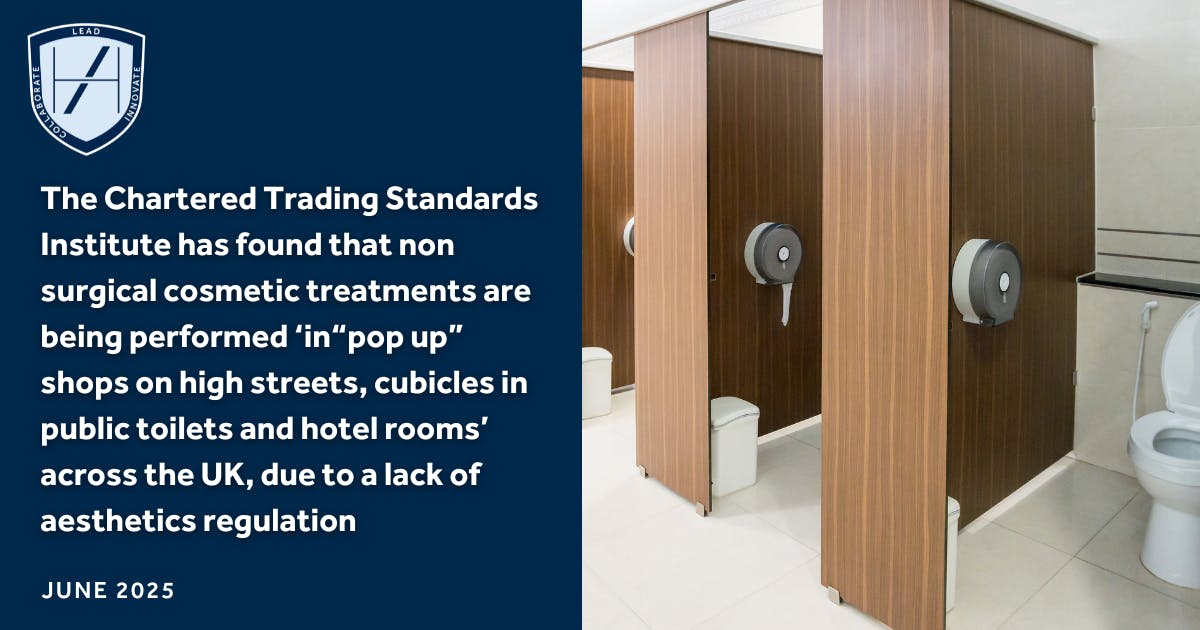‘Huge Health Risk’: New Urgent UK Aesthetics Regulation Call

Trading Standards has added its voice to calls for urgent aesthetics regulation in the UK. On 18th June 2025, the The Chartered Trading Standards Institute (CTSI) published a damning report into the ‘huge health risk’ currently posed to the public.
The report revealed some shocking discoveries across the UK, in relation to unsafe non surgical cosmetic treatments, practitioners and premises.
It warned the public of the current “wild west of untrained, unlicensed and uninsured individuals who may be putting lives in danger.”

Fillers administered in public toilet cubicles
CTSI stated in a press release, ‘Trading Standards officers have uncovered shocking locations where procedures such as fillers are being administered including “pop up” shops on high streets, cubicles in public toilets and hotel rooms. These locations fall outside of typical business premises and makes taking action against unscrupulous businesses and practitioners much more difficult.’
It further outlined some of the concerns highlighted in the report, including “Unsafe and unregulated filler products readily available for sale online to everyday consumers for as little as £20.”
This sat alongside well-established issues, such as the fact that many aesthetic practitioners across the UK are unqualified, and practising from unlicensed premises.
Newer concerns were also raised, relating to weight loss injections such as Ozempic and Mounjaro, plus 'fat dissolving' injectables including Lemon Bottle. The report explained that these have 'little to no regulatory oversight to ensure their safe use by the public. These injections do not fall under the remit of the Medicines and Healthcare products Regulatory Agency (MHRA).'
Young patients crossing the border for treatment
CTSI described the situation regarding UK discrepancies over the minimum age for aesthetic treatments as a ‘postcode lottery’. It noted how young people are crossing the border into Scotland to have these procedures carried out.
At present, the legal minimum age requirement for aesthetic treatments such as botox and fillers, for cosmetic purposes, is 18 years in England. This came into law in 2021 and includes the provision of consultations for these treatments, as well as the treatments themselves.
Scotland and Wales have no such mandate at present. As part of its current review of the non surgical cosmetic sector, with a view to introducing a new licensing scheme, Scotland is said to be ready to introduce a ban on these procedures for under 18s. However, this is still very much in the early stages.
Whilst Northern Ireland is also considering this, it currently has no such legal provision either.
Burdening an ‘already overstretched’ NHS
The fact that there is no ‘collation of NHS data that shows the burden placed on already overstretched services through dealing with infections and life-threatening complications’ was also under the spotlight.
In the main, NHS professionals are not trained to deal with complications from aesthetic treatments. Whilst healthcare professionals working in aesthetic medicine should be able to confidently handle the vast majority of complications arising from fillers or botox, those without a medical background and dedicated aesthetics training in this area, are unlikely to have the necessary skills.
With many injectors being non-medics and practitioners of both backgrounds frequently being under-educated, patients are increasingly experiencing complications and landing at the NHS’s door.
This lack of education is partly down to a lack of regulation for aesthetics training schools. An entire unscrupulous industry has boomed, largely thanks to social media, where filler and botox courses are freely available - often at great expense - that barely scratch the surface. They can leave injectors with a false sense of accomplishment, not knowing how unprepared they are.
Lack of aesthetics regulation and clarity of responsibilities
Another point - and one we’re all acutely aware of - identified in the Trading Standards report is the ‘major gaps in regulation’. They also pinpoint the ‘lack of clarity on who is responsible for the products and procedures’.
Trading Standards pushed for the following actions, in light of its findings, backed by a number of charities:
- An aesthetics licensing scheme
- For a 'Ministerial-led government Task Force' to help with this regulation
- England's underage legislation to be rolled out to Wales, Scotland and Northern Ireland
- Unsafe products sold online to be removed from sale.
To many of us, this feels all too familiar. It's been 12 years since the Keogh Report was published and we are still no further forward. The only movement we’ve had since April 2013 was the 2021 ruling to establish a legal minimum age requirement for non surgical cosmetic procedures.
What was the Keogh Report?
The Keogh Report, formally titled “Review of the Regulation of Cosmetic Interventions”, was a UK government-commissioned report, led by Professor Sir Bruce Keogh.
It was launched in response to growing public and professional concern over the safety and ethics of surgical and non-surgical cosmetic procedures in the UK. This was particularly heightened at the time due to the PIP breast implant scandal. The report examined the state of regulation and published its recommendations for improving patient safety for the sector.
It identified the following areas of concern:
- Lack of aesthetics regulation: Non-surgical treatments such as botulinum toxin and dermal fillers were poorly regulated, with anyone legally able to administer them, despite botox being a prescription-only medication
- Informed consent gaps: Many patients were not being properly informed about risks, alternatives, or expected outcomes
- Insufficient aesthetics training: No consistent standards for aesthetics courses, particularly for non-medical practitioners, was found
- Weak aftercare systems: Many injectables patients received little support or pathways for redress after complications or unsatisfactory results.
In response to these, it set out a number of proposals, including:
- Stronger regulation of dermal fillers, treating them as prescription-only medicines
- Accredited aesthetics training and qualifications for all practitioners offering cosmetic procedures
- Mandatory insurance and registration for all aesthetic practitioners.
- Improved patient consent processes and cooling-off periods before treatment.
Health Education England guidelines for aesthetics training
The Keogh Report recommendations directly informed the 2015 Health Education England guidelines for delivering aesthetics training.
These called for a ‘competency-based’ approach to aesthetics courses, where clinicians demonstrated both theoretical and practical competence. Aesthetic practitioners were expected to perform under supervision and be assessed in clinical scenarios.
Topics including facial anatomy, complications management, informed consent, and professional boundaries were flagged as core necessities of any curriculum.
These guidelines were intended for regulated healthcare professionals only, such as doctors, dentists, nurses, and prescribing pharmacists. They made clear that injectables should only be administered by, or under the oversight of, a prescriber trained to manage complications.
This guidance was, and still is, considered to be the benchmark for responsible aesthetic education.
Developing the Level 7 from the HEE guidelines
This is the framework to which Harley Academy Founder & CEO, Dr Tristan Mehta mapped the original Level 7 in botox and fillers. He was conscious of the lack of robust training options available at the time, when he had explored aesthetic medicine courses, and wanted to provide healthcare professionals with a meaningful alternative. One that adhered to the guidance and took account of the Keogh Report recommendations.
Harley Academy’s initial offering became the first ever Ofqual-regulated postgraduate aesthetics training course for healthcare professionals. It was also the first to be approved by the Joint Council for Cosmetic Practitioners (JCCP).
In the 10 years that have passed since then, we’ve constantly innovated and elevated the content and delivery of all our filler and botox courses. We’ve even produced our own evidence-based framework for medical aesthetic practitioners, the Global Evidence Matrix, for improved safety.
Yet we are still awaiting any formal legislation to help regulate practitioners, aesthetics education and the sector in general.
The wait for aesthetics regulation continues
Even after promising moves in 2023, when the non-surgical aesthetics remains poorly regulated. This puts patient safety at risk from untrained or unethical practitioners.
Despite years of warnings, various recommendations, consultations and pressure from campaigners, consistent national standards are still missing.
It’s disappointing that the regulatory landscape moves so slowly while the industry continues to grow without proper safeguards.
We’ve not heard any official government quotes on the topic since 2024. At that time, the current health minister, Wes Streeting, MP, commented following the first UK death from a BBL (Brazilian Butt Lift). He said, “We are working as fast as we can, we know that we need to act - we are taking this seriously, we’re going as fast as we can.”
Whilst positive steps are rumoured to be happening behind the scenes, there is still no concrete movement to protect the public.
We have always been invested in the push for aesthetics regulation to protect both patients and practitioners. This is something we are unwavering in.
It is unacceptable that anyone can inject a face without appropriate training, oversight or accountability. Patients deserve protection, not profit-driven experimentation. We have the evidence, the frameworks, and the urgent need for a robust regulatory framework in the UK. Every delay leaves more people at risk of harm that is entirely preventable.
We look forward to hearing the government’s response to the Trading Standards findings, and will update this article with any that becomes available.
All information correct at time of publication
Download our full prospectus
Browse all our injectables, dermal fillers and cosmetic dermatology courses in one document
By submitting this form, you agree to receive marketing about our products, events, promotions and exclusive content. Consent is not a condition of purchase, and no purchase is necessary. Message frequency varies. View our Privacy Policy and Terms & Conditions
Attend our FREE open evening
If you're not sure which course is right for you, let us help
Join us online or in-person at our free open evening to learn more
Our Partners













STAY INFORMED
Sign up to receive industry news, careers advice, special offers and information on Harley Academy courses and services


